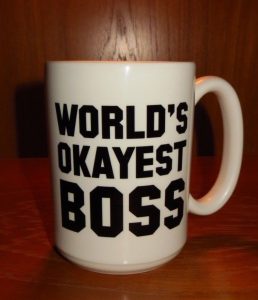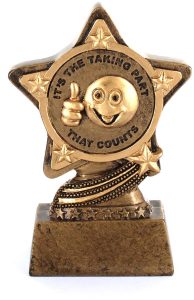Short answer = everybody needs external validation.
We all begin life in a state of complete reliance on external validation. From cues we receive from others around us, we form opinions about whether our behaviors/opinions/attitudes/beliefs/values are good and praiseworthy — or not. For example:
- Is it okay to take food off another person’s plate?
- Is there a god? And if so, which one?
- Is going to a place of worship necessary?
- Is walking naked down the street acceptable?
- Is the world a safe place?
- When is it okay to lie?
- What sort of beauty, hygiene, or grooming standards are most desirable?
- Is sex before marriage okay?
- Is it okay to be LGBTQ?
- What obligations are owed to family members?
- Are handwritten thank you notes necessary?
When we are validated by others it feels good, and this tends to make us want to behave in a similar fashion in the future, in order to experience the same good feelings. Seeking validation from others means seeking their approval for your thoughts, feelings, beliefs, choices, values, and actions.
Social psychologist C. H. Cooley called this reliance on external validation “The Looking Glass Self.” In his book On Self and Social Organization, he summed up humans’ tendency to rely on others’ perceptions to form their own sense of identity as “I am not what I think I am and I am not what you think I am; I am what I think that you think I am.”
A Necessary Thing
Seeking external validation in unfamiliar situations is normal, healthy, and valuable.
You need to be able to take instructions and constructive criticism from others in order to collaborate with peers or even simply to function in society. Thus, as adults, external validation is a necessary part of being human, even if the American ideal of individualism tells us otherwise.
The desire to seek validation stems from the basic human need to be liked and accepted by others. If all our behaviors, opinions, attitudes, and beliefs are ignored or wrong (based on cues from others), low self-esteem is a likely result. If one has a fragile sense of self-worth, it can be hard to validate one’s own experiences, resulting in a need to seek approval from others.
Seeking validation from others has become a common way of living. Often we do things hoping to be praised by others so that we can feel good about ourselves. Or we avoid doing or saying something because we worry that we will be criticized by someone for our opinion, idea, action, or choice.
The need for external validation is at an all-time high. More than ever, people want to feel seen and heard and to know their life matters. Indeed, perhaps the extensive use of social media is evidence of that. When you turn down the volume of everything going on in the world around you, these questions are probably on repeat in the back of your mind, too.
A Good Thing
You don’t need to seek external validation for it to feel good! Whether someone compliments you at work, comments on a picture you posted, or expresses gratitude for you, this is external validation.
In some cases, external validation is more concrete than in others. For example:
- Pay raises
- Promotions
- Scholarships or fellowships
- Medals
- Awards
- Winning elections
- Making the NYT bestsellers list
Good news: If you are in a relationship that makes you feel heard, valued, and understood, the positive effects spread. Having someone who understands and validates your feelings can be nothing short of fulfilling. Such validation builds one’s self-esteem and one’s confidence in a broader sense.
As Belgian psychotherapist Esther Perel said, “Self-love is about letting others love us even when we feel unlovable because their version of us is kinder than our own.”
Too Much of a Good Thing
Some people need constant validation because they’re not confident in their own abilities. Some say that the root cause of most approval-seeking behavior is low self-esteem. This feeling of inferiority stems from factors like inherent personality, upbringing, peer pressure, education, culture, and work-life. As negative feedback accumulates over time, the need to seek approval for anything and everything grows.
Besides low self-esteem, attention-seeking behavior may stem from jealousy, loneliness, or as a result of a personality disorder.
While desiring external validation is normal and healthy, it can go too far when desiring praise and attention from others becomes an addiction, and/or when it is not balanced by healthy levels of self-esteem. Why do you need constant validation? Dr Preeti Kocchar, says that people crave attention for a variety of reasons, including—in some extreme cases—the presence of personality disorders.
For example:
- Narcissists constantly need attention and validation. They constantly try to elicit praise and approval from others to shore up their fragile egos, but no matter how much they’re given, they always want more.
- Histrionic personality disorder is a type of psychiatric disorder that features attention-seeking behaviors, seductive behavior, and emotional over-reaction.
- Perfectionism also leads us to constantly seek positive approval from others, impeding our ability to accept constructive feedback from others or internal validation from ourselves.
What does an unhealthy reliance on external validation look like? Not being able to confront people or disagree, changing your thoughts and beliefs because someone else either approves or disapproves, and ascribing your self-worth to the approval of others — all are examples of a reliance on external validation.
People always looking for external validation to feel good about themselves can be extremely irritating, leading to negative feedback, resulting in a greater need for external validation … a vicious circle.
Do You Rely Too Much on External Validation?
You may be searching for too much external validation if you find yourself doing the following:
- Feeling guilty about setting boundaries with others.
- Overachieving in an attempt to garner praise from others.
- Pretending to be unable to do something so someone will teach, help, or watch the attempt to do it.
- Expressing controversial opinions or behaviors primarily to provoke a reaction in others.
- Pointing out acgievements or “humble bragging” to elicit compliments.
- Embellishing stories to gain praise or sympathy.
- Jumping from relationship to relationship without taking the time to heal because you feel you can’t be alone.

Want to seek external validation less? Try these five ways:
- Trust yourself.
- Stop comparing yourself with others.
- Be aware of your actions.
- Practice self-love.
- Don’t measure yourself on the basis of social media likes.
Bottom Line: Everyone seeks external validation sometimes, in some situations—which is not only natural and healthy, but also necessary. However, in this case, too much of a good thing is NOT still a good thing.






